 Introduction to Ayurveda
Introduction to Ayurveda
Ayurvedic medicine, also known as Ayurveda, is one of the world’s oldest holistic healing systems. It was developed thousands of years ago in India. It is based on the principle belief that health and wellness depend on a delicate balance between the mind, body, and spirit.
The prime aim of Ayurveda is to achieve good health, rather than fighting the disease.
Ayurveda Concepts
According to Ayurveda everything in the world, living or not, is interconnected. Good health can only be achieved when your mind, body and spirit is in harmony with the universe. In Ayurveda, anything that may affect your physical, spiritual and emotional well being may cause you to be out of balance with the universe. Some things that can cause a disruption include:
- Genetic or birth defects
- Injuries
- Climate and seasonal changes
- Age
- Emotions
How your body works to keep you healthy and your unique physical and psychological characteristics combine to form your body’s constitution, or Prakriti. Your Prakriti is believed to stay the same for your entire life. However, how you digest food and eliminate waste can influence it.
Every person is composed of five basic elements found in the universe
- Space
- Air
- Fire
- Water
- Earth
These elements combine to form Doshas, the three life forces or energies. The Doshas controls how your body works. The three Doshas are
- Vata (Space and air)
- Pitta (Fire and water)
- Kapha (Water and earth)
Everyone inherits a unique combination of these three Doshas. One Dosha is usually more dominant. Each Dosha serves as means to control different body functions. The chances of getting sick are linked to the balance of your Doshas.
Vata Dosha
 Vata Dosha is thought to be the most powerful of the three Doshas. It controls very basic body functions such as cell division. It also controls the mind, breathing, blood flow, heart function and waste ejection in the intestines.
Vata Dosha is thought to be the most powerful of the three Doshas. It controls very basic body functions such as cell division. It also controls the mind, breathing, blood flow, heart function and waste ejection in the intestines.
Things that cause disruption to this Dosha are fear, grief, staying up too late, consumption of dry food and eating too soon after a previous meal.
If Vata Dosha is more dominant in your body, you are likely to develop anxiety, asthma, heart diseases, nervous system disorders, skin problems and Rheumatoid arthritis, a disease affecting the joints.
Pitta Dosha
 Pitta Dosha controls digestion, metabolism and certain hormones that are linked to appetite.
Pitta Dosha controls digestion, metabolism and certain hormones that are linked to appetite.
Things that throw pitta Dosha out of control are eating sour and spicy food, fatigue and prolonged exposure to sun.
If Pitta Dosha is more dominant in your body, you are likely to develop anger and negative emotions, heart disease, heart-burn few hours after eating, high blood pressure, infections and Crohn’s disease, a chronic inflammatory disease.
Kapha Dosha
 Kapha Dosha controls muscle growth, body strength and stability, weight and the immune system.
Kapha Dosha controls muscle growth, body strength and stability, weight and the immune system.
Things that disrupt this Dosha are daytime sleeping, eating after your stomach is full, consuming too much sweet, salty and water like foods, and greed.
If Kapha Dosha is more dominant in your body, you are likely to develop asthma and other breathing disorders, cancer, diabetes, nausea after food and overweight.
Ayurvedic treatment
The first step to Ayurveda treatment is to determine your dominant Dosha and the balance among the other non-dominant ones.
Ayurvedic treatment depends on your unique Prakriti, your dominant Dosha and the balance between all the three of them. The main goal of Ayurvedic treatment is to cleanse your body of the undigested food. This cleansing process is called Panchakarma.
Panchakarma is a Sanskrit word that means “five actions” or “five treatments”. It reduces any symptoms and helps to re-establish harmony and balance in the body. Panchakarma includes three parts.
Poorva Karma consists of:
- Paachan (Digestion)
- Snehan (Internal and external oleation)
- Swedan (Fomentation)
Pradhan Karma consists of:
- Vaman (Induced vomiting)
- Virechan (Induced purgation)
- Vasti (Medicated enema)
- Nasya (Nasal medicine)
- Rakta Moesha (Artificial bloodletting)
Pradhan Karma is the main method in the process of panchakarma.
Pashchat Karma
 This consists of Sansarjan Krama (Specific dietetics), Dhuma-Pana (Herbal fumigation) and some rules to follow while doing specific activities.
This consists of Sansarjan Krama (Specific dietetics), Dhuma-Pana (Herbal fumigation) and some rules to follow while doing specific activities.
Pashchat Karma includes the post-curing measures.
Benefits of Panchakarma
- Removes the root cause of disease
- Balances the bodily Humour Vata, Pitta and Kapha
- Improves Immunity
- Balance the Nervous system, Blood circulatory system, Digestive system and also as well as Physiological equilibrium
- Remove the Toxins situated at the week point of body
- Increases Mental and Physical efficiency
- Increases skin glow
- Reduces extra fat
- Remove insomnia, anxiety and mental problem
- Increases loss of vigour and stamina
- Increases joint mobility
Ayurvedic Medicine
The herbs commonly used in the manufacture of Ayurvedic medicine are highly nutritive with a lot of healing properties. Today, Ayurveda and its herbal treatment flourish side by side with Homeopathic and Western conventional medicine. Ayurvedic medicines are said to have no side effects. Each herb is unique in its medicinal properties and has a good aroma and flavour. It acts as a perfect mechanism in bringing a balanced harmony between the mind and spirit. When compared to other synthetic drugs, Ayurvedic herbal medicines do not cause any side effects. It works effectively fighting against various infections and diseases and thereby provides quick and easy recovery.
 Ayurvedic science focuses on both the external and internal features rather than simply focusing on curing a disease. They renew the whole system rather than the focus being concentrated towards a specific organ of the body.
Ayurvedic science focuses on both the external and internal features rather than simply focusing on curing a disease. They renew the whole system rather than the focus being concentrated towards a specific organ of the body.
Benefits of Ayurvedic medicine
- Building Immunity
- Better Healing
- Reducing Stress
- Cleansing the Body
- Achieving Overall Balance
The Ayurvedic approach is holistic, so therefore after an Ayurvedic treatment, the patient will experience an improvement in the physical, mental and psychological conditions. The ingredients used in Ayurvedic medicines are mostly derived from herbs, plants, flowers, fruits etc. making it a remedy close to nature. Ayurveda has been found to be an effective cure for many chronic diseases and has practically no side effects. Compared to other methods of treatment, the Ayurvedic approach can bring out wellness to the entire body, and is found to be effective for a prolonged time period. It is based on the fact that “Prevention is better than cure”.
Ayurvedic medicines are effective even for healthy people as they are restorative in nature and helps in nourishing the body and enhancing the mental abilities. Ayurvedic therapies can give relief from stress and rejuvenate the body. Ayurvedic treatment is affordable and is comparatively cheaper compared to other systems of medicine.
Article Source: http://EzineArticles.com/8823454



Your information is very interesting. Thank you for sharing